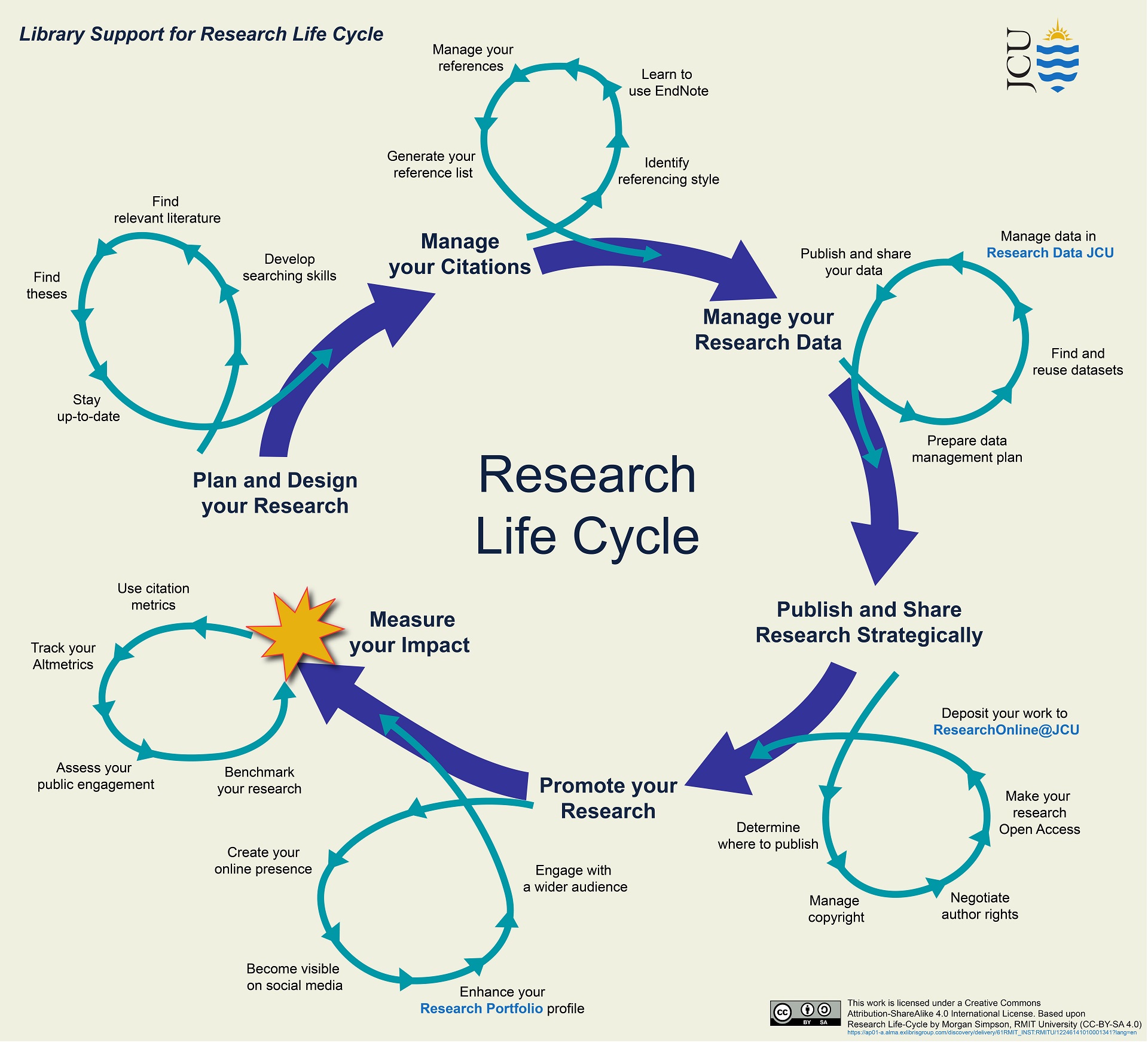Whether you are a novice researcher at the start of a HDR candidature or a seasoned senior researcher, you are constantly moving along the Research Lifecycle. No matter where you are on the Research Lifecycle, updating your research skills is essential as funding bodies, journals, searching, citation, promotion and benchmarking tools all keep changing.
Keeping those research skills current is where the Library can help. The figure below illustrates the cyclical nature of the research lifecycle and where it intersects with academic librarian support. Aspects of this support are found in the workshops the Library runs and the Library guides that target the different parts of the Research Life Cycle.
Below you will find some guides and workshops that assist at the different stages of the Research Lifecycle to keep your research skills current. Workshops that are hyperlinked are still available for you to register and attend this year. Workshops without a hyperlink were offered earlier in the year. If you contact Stephen Anderson, he can provide you with the Zoom recording. The library will continue to offer these sessions throughout 2023 and 2024.
To support Researchers in this part of the Lifecycle we have the following guides: Publishing Academic Research, Open Access Publishing and ResearchOnline@JCU. The Library runs several workshops on this topic:
Some of the ways to promote your research include your JCU Research Portfolio, ORCID, Scopus Author ID, Web of Science Research profile, Google Scholar and using social media and altmetrics to promote your research. The JCU Library has the following guide Researcher Profiles, Identifiers and Engagement and workshop to assist build those skills:
Resources the Library has to assist in this endeavour are the guide Using Research Indicators and workshop:
There is much support from the Library to update and improve your research skills both in guides and workshops. If you weren’t able to attend a workshop that was offered earlier in the year feel free to contact Stephen Anderson and he can provide you with the Zoom recording. The library will continue to offer these sessions throughout 2023 and 2024. Finally, at any stage you can contact the Library for advice about each stage of the Research Lifecycle by connecting with one of our Scholarly Communications team or one of our Liaison Librarians
Good luck with your Research!
Keeping those research skills current is where the Library can help. The figure below illustrates the cyclical nature of the research lifecycle and where it intersects with academic librarian support. Aspects of this support are found in the workshops the Library runs and the Library guides that target the different parts of the Research Life Cycle.
1. Plan and Design your Research
In this initial stage you develop a research plan for your research, clarify your research question and conduct your literature search. To help in this area the Library has the Systematic Style Reviews guide and following workshops:- Searching for Systematic Style Reviews (Health Disciplines) for Academics
- Searching for Systematic Style Reviews (Non-Health Disciplines) for Academics
2. Managing your Citations
Keeping track of the research you have identified is important and being able to reference in the correct journal style is important. JCU Library provides access to Endnote to assist in this endeavour. The Library supports Endnote via the EndNote Guide as well as providing 3 different levels of Endnote workshops.- Introduction to EndNote
- Advanced Endnote for Academics
- Endnote for Systematic Reviews for Academics
3. Manage your Research Data
Researchers can unlock benefits and contribute to the progress of research by managing research data effectively and sharing it with others. More information about managing your research at JCU can be found at: https://research.jcu.edu.au/data/default/rdmp/home4. Publish and Share Strategically
Publishing and sharing research results and new knowledge is a responsibility for all researchers. There are many pitfalls to look out for when publishing your research outputsTo support Researchers in this part of the Lifecycle we have the following guides: Publishing Academic Research, Open Access Publishing and ResearchOnline@JCU. The Library runs several workshops on this topic:
- Depositing your research in Research Online
- Avoiding Predatory publishing
- Open access Q&A drop-in
- Demystifying Copyright and creative commons (Research publications)
- Open Access publishing for Academics
- Publishing academic research
5. Promote your Research
Your research is important and needs to be shared and fed back into the research community so that it can inform, have impact, and be built upon. This also assists your career trajectory.Some of the ways to promote your research include your JCU Research Portfolio, ORCID, Scopus Author ID, Web of Science Research profile, Google Scholar and using social media and altmetrics to promote your research. The JCU Library has the following guide Researcher Profiles, Identifiers and Engagement and workshop to assist build those skills:
- Researcher profiles for Academics
6. Measure your research
Having completed your research you need to measure its impact and benchmark yourself against others to identify what worked and what needs to improve in future research endeavours.Resources the Library has to assist in this endeavour are the guide Using Research Indicators and workshop:
- SciVal for Academic Promotion
There is much support from the Library to update and improve your research skills both in guides and workshops. If you weren’t able to attend a workshop that was offered earlier in the year feel free to contact Stephen Anderson and he can provide you with the Zoom recording. The library will continue to offer these sessions throughout 2023 and 2024. Finally, at any stage you can contact the Library for advice about each stage of the Research Lifecycle by connecting with one of our Scholarly Communications team or one of our Liaison Librarians
Good luck with your Research!

Comments